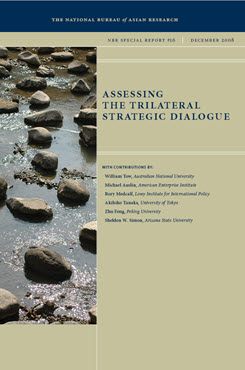The Trilateral Strategic Dialogue
Facilitating Community-Building or Revisiting Containment
This Special Report weighs the policy implications of the Trilateral Strategic Dialogue (TSD) and assesses its efficacy as a component of Asia-Pacific security architecture.
EXECUTIVE SUMMARY
This Special Report weighs the policy implications of the Trilateral Strategic Dialogue (TSD) and assesses its efficacy as a component of Asia-Pacific security architecture.
MAIN FINDINGS
- If managed successfully, the TSD can facilitate the integration of bilateral and multilateral models of security politics in the Asia-Pacific. Rigorous coordination of public statements and policy initiatives, however, will shape the degree to which such integration can be realized.
- The so-called quadrilateral initiative, in which India would join the TSD framework, was effectively neutralized, and eventually jettisoned, by domestic political developments in Australia and Japan.
- The 2008 U.S. presidential campaign failed to address the TSD and the U.S. bilateral alliance network, raising some minor apprehensions, particularly in Australia, over the future of U.S. alliance management in the region.
- There is optimism regarding the TSD’s ability to avoid China perceiving the arrangement as a containment strategy. In part, however, that outcome is dependent on how China carries out its own regional security behavior in the near to mid-term.
- Given the legacy of successful bilateral Australia-Japan political-security relations, initial strains in Australia-Japan relations shaped both by Japan’s perceptions that Australian prime minister Kevin Rudd was too “China-centric” in foreign policy orientation and by lukewarm responses in the region to Rudd’s Asia-Pacific Community proposal will be temporary.
POLICY IMPLICATIONS
- The TSD needs to avoid being seen—both in the allied capitals and in Beijing—as an instrument of containment directed against China.
- The new U.S. administration must place a consistent and concentrated emphasis on the TSD’s potential for bridging bilateral and multilateral security politics in the Asia-Pacific.
- The TSD’s credibility will hinge largely on its success in defining and implementing nontraditional areas of security collaboration. The decision to initially focus on disaster relief and humanitarian assistance was appropriate. Additional areas of collaboration in both traditional and nontraditional security politics would benefit the TSD.


